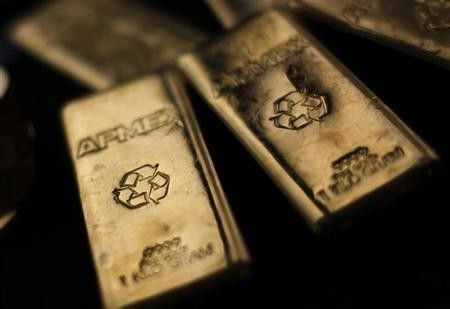Gold Prices Rise More Than 1% On Monetary Easing Hope

(REUTERS) -- Gold prices rose more than 1 percent on Monday, recovering from last week's hefty drop after disappointing U.S. jobs data revived hopes for fresh monetary easing and a spike in Chinese inflation boosted appetite for the metal.
Market watchers said a report on Friday showing that U.S. employers had hired far fewer workers in March than in previous months could keep the door open for the Federal Reserve to provide more monetary support for a still sluggish economy.
Our economists note the report had an undeniably weak tone and will raise doubts about the strength of the labour market, said Barclays Capital in a note on Monday.
While (they) do not believe that this report alone will propel renewed policy action in April, the door to further quantitative easing remains ajar and may shift the decision point to the June FOMC (meeting) as the Fed continues to monitor the incoming data.
Ultra-loose U.S. monetary policy keeps real interest rates, and consequently the opportunity costs of holding non-yielding bullion, at rock bottom and was a major factor in driving gold prices to record highs last year.
Spot gold was up 1 percent at $1,646.19 an ounce at 1312 GMT, while U.S. gold futures for April delivery were up $18.00 an ounce at $1,648.10. Trading was thin, with most European financial markets closed for the Easter holidays.
A higher-than-expected reading on China's annual inflation in March supported sentiment in gold. Analysts also dismissed the possibility that the data would dissuade Beijing from its pro-growth monetary policy.
If we see more RRR (reserve requirement ratio) cuts, it will be positive for gold as it will raise inflation outlook down the road, said Li Ning, an analyst at Shanghai CIFCO Futures.
China's physical gold demand jumped 20 percent last year, compared with a 7 percent overall rise in global demand, according to the World Gold Council. Analysts have predicted China will take over from India as the world's top gold consumer this year.
BEWARE OF DOLLAR
Despite the sluggish payrolls data, analysts said a generally improving U.S. economy and a dragging euro zone debt crisis could lead to further dollar strength, which in the short term might weigh on commodities priced in the greenback, including gold.
The dollar index held steady on Monday after sliding on the U.S. jobs data in the previous session. But the dollar still managed to post a 1.3 percent gain last week.
The pattern we've seen over the past few months, namely a strong U.S. and a weaker Europe, is likely to continue to keep the dollar supported, said Li of Shanghai CIFCO.
Data from the U.S. Commodity Futures Trading Commission echoed the sentiment. Speculators cut their bullish bets on gold futures and options in the week ended April 3.
In the physical market, jewellers in India called off their three-week-old strike on Saturday, an industry official said, on assurances from Finance Minister Pranab Mukherjee that the government would consider scrapping a budget proposal to levy excise duty on unbranded jewellery.
Gold traders in India booked some deals after the strike, seeking to replenish stocks for a gold-buying festival slated later in the month.
The sharp drops in prices in the past week attracted some physical buying interest from China, traders said.
Premiums in China were much higher, and that attracted quite a bit of buying, said a Shanghai-based trader.
Buying has slowed as prices have pulled back from a near three-month low of $1,611.80 an ounce hit last week, traders said.
Among other precious metals, silver was down 0.1 percent at $31.69 an ounce, spot platinum was up 1.3 percent at $1,612 an ounce and spot palladium was up 1 percent at $644.72 an ounce.
© Copyright Thomson Reuters {{Year}}. All rights reserved.






















